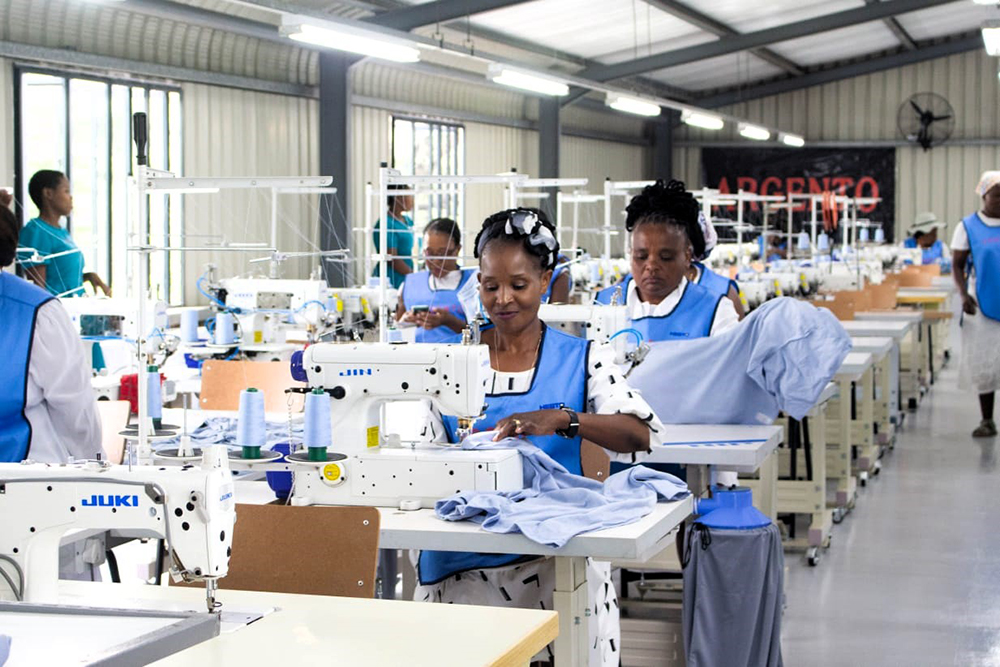Since his appointment two months ago, the Minister of Trade, Industry and Competition, Mr Parks Tau has consistently emphasised the acceleration of the implementation of the sector master plans as one of the key priorities of the 7th Administration. Tau has been reiterating the critical role of the master plans in increasing investment, boosting exports, creating jobs, promoting localisation and facilitating transformation.
The stories of two companies that operate in the clothing and textile sector undoubtedly illustrate the critical importance of the master plans, and the positive impact of the collaboration between government, business and labour on the South African economy.
One of the interventions initiated by this partnership in the Retail–Clothing Textile Footwear Leather Master Plan, where more that 20 000 jobs have been created as a result of its roll-out, is the redesigned Clothing Textile Footwear Leather Growth Programme (CTFLGP), which was launched in 2022. Import substitution, creation of new jobs, transformation and competitiveness improvement are the main objectives of the programme.
According to the Director of Clothing and Leather at the dtic, Dr Jaywant Irkhede, more than R1.87 billion had been approved for 154 businesses employing almost 24 000 people and R1.41 billion disbursed by July this year.
One of the beneficiaries of the programme that is being implemented by the Department of Trade, Industry and Competition (the dtic) through the Industrial Development Corporation, is R and L Apparel. It is a woman-owned company based in Newcastle, KwaZulu-Natal. The company received financial support for the purchase of equipment and machinery, as well as for initial working capital, in order to grow their Cut, Make, Trim (CMT) manufacturing capacity.
According to the Managing Director of R and L Apparel, Ms Solis Benjie Dolores, the support enabled the company to increase its production, improve product quality, create jobs and extend its clientele, which now includes The Foschini Group, which they supply through Celtico, one of the CMT suppliers in the Newcastle clothing industry
“The funding assisted us greatly in creating additional jobs. We had only 17 workers when we applied for the programme. As of August 2024, we were able to reach a staff complement of 103 employees, 98 of whom are women. As a matter of fact, we are looking forward to achieving the additional 150 jobs that we have committed to,” says Dolores.
“The CTFLGP is a great initiative. The programme opened new doors for our company’s growth. Without the funding, we might have just stayed on 17 workers, because our machinery and working capital were very limited. Before we received the funding, we were running a hand-to-mouth operation that was kept going only by the dedication and endeavours of our team. Now the company is on a positive growth trajectory,” adds Dolores.
She says the company is planning to acquire automated machinery to expand its production capacity based on the market demands, as local retailers are increasingly embracing Proudly South African products.
“We are happy to contribute in import substitution, growing the economy, and more importantly, creating jobs for the local people, both skilled and unskilled, assisting them to earn a decent living,” notes Dolores.
The Managing Director of Argento, Ms Joudalle Govender also bears testimony to the positive impact of the CTFLGP on her company, which is based in Mandeni, KwaZulu-Natal. The company manufactures apparel and corporate clothing for a major retailer and numerous corporate clients.
“We used the funding for operational expenses and to re-tool the factory with new machinery. The funding allowed us to create 45 new jobs. 100 people are currently employed in our company, 80 of whom are women. Our profit margins increased and we had a rapid growth in production due to the extra capacity,” says Govender.
She adds that the company is planning to expand its product lines, adopting sustainable practices, improving its manufacturing efficiency and exploring new markets.
“Our future plans include expanding our current building and creating 100 more jobs. We are also looking into exporting our local garments and creating more awareness on local manufacturing with South Africa,” adds Govender.
She emphasises the importance of the Retail-Clothing, Textile, Footwear and Leather (R-CTFL) Masterplan in promoting sustainability and innovation within the industry, which she says is crucial in adapting to the changing market demands and consumer preferences.
“I love the fact that the plan focuses on several key objectives, such as job creation and increasing local production. Argento is a local champion because we produce our own local fabric in the rural area of Isithebe. My favourite part is that the plan enhances competitiveness in the global market, by fostering collaboration between government, labour, and industry stakeholders. That is important for our economy,” stresses Govender.
Clothing and Textile Master Plan creating and retaining jobs:

Machinists at Argento Clothing, Ms Senzeni Maphumulo and Ms Nokukhanya Ntuli
 Machinist at R and L Apparel, Ms Nobuhle Nkosi
Machinist at R and L Apparel, Ms Nobuhle Nkosi
For media enquiries and interviews:
Bongani Lukhele – Director: Media Relations
Tel: (012) 394 1643
Mobile: 079 5083 457
WhatsApp: 074 2998 512
E-mail: BLukhele@thedtic.gov.za
Issued by: The Department of Trade, Industry and Competition (the dtic)
https://www.facebook.com/thedti?mibextid=ZbWKwL
https://www.youtube.com/@thedtic

